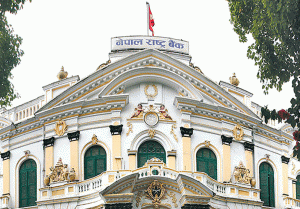Nepal Rastra Bank is the central bank of Nepal that regulates and supervises all commercial banks, development banks, financial institutions and microfinance companies. It was founded on April 26, 1956, under the Nepal Rastra Bank Act, 1955.
As of now, the NRB is functioning under the new Nepal Rastra Bank Act, 2002.
Major functions of NRB are to formulate required monetary and foreign exchange policies so as to maintain the stability in market prices, to issue currency notes, to regulate and supervise the banking and financial sector, to develop efficient payment and banking systems among others. The NRB is also the economic advisor to the government of Nepal.
Here are five interesting facts about the NRB that you may not know:
1. NRB is the regulator of other banks but was established late than one of them

The NRB, ‘the guardian organisation of the entire banking and financial sector’ that also has the right to dismiss as well as to permit the establishment of any banks and financial institutions, was in fact established in 1956 only, after 19 years of establishment of the first bank of Nepal in 1937, Nepal Bank Ltd. It is like a parent being younger than his/her children.
2. NRB’s one of first achievements was ending the use of Indian currency

Although Nepal was and still is the sovereign country, before the establishment of the NRB, most of the people used to use Indian currency here. Nepali currency was not found in the Nepali market. Specifically, in the Terai belt, only Indian currency was used and accepted.
As shared by NRB’s first governor Himalaya Shumsher JB Rana in a public event, King Mahendra established the central bank to displace the use of Indian currency. And, actually, after the establishment of the NRB, the use of Indian currency ended.
Earlier, the Indian currency exchange rate used to be decided and declared by the traders of Indrachok and Makhan. It took about three years to set up the Indian currency exchange rate (NRs160 = IRs 100). Interestingly, this exchange rate is still the same even after decades.
3. NRB opened its first bank account in India

After its establishment, the central bank of Nepal opened its first bank account in the central bank of India, Reserve Bank of India, before operating accounts of other banks in Nepal.
To open its bank account in Reserve Bank of India, Governor Himalaya Shumsher JB Rana sent a letter to then India’s secretary of economic affairs, Braj Kumar Nehru. And, in the direction of Nehru, the first account of NRB was opened there.
Subsequently, NRB opened its account in another bank of India and then in one bank of London.
4. NRB held foreign exchange reserves in Indian banks

Before 1956, Nepal’s foreign exchange reserves were held in Indian banks. For getting the foreign currency amounts required to bear the expenses of Nepali Embassy in London and health treatment expenses of King Tribhuvan, an application had to be submitted to the Reserve Bank of India.
Only a year after the NRB came into operation, Nepal became independent in foreign exchange operations. As of now, Nepal’s foreign exchange reserves are held by the NRB itself. Only a certain percentage of foreign exchange reserves is held by other banks.
5. NRB issued the first monetary policy after 46 years of establishment

Basically, monetary policy is a policy that is formulated so as to control the supply of money. This policy is formulated by the central bank of the country worldwide and Nepal and the NRB are no exception.
The central bank has been formulating monetary policy every year to help in the implementation of the government’s annual policy and programme as well as the budget plan and to maintain financial stability. What is interesting here is that the NRB formulated its first monetary policy in the fiscal year 2002/03 only after 46 years of its establishment under the governorship of Tilak Rawal.


























